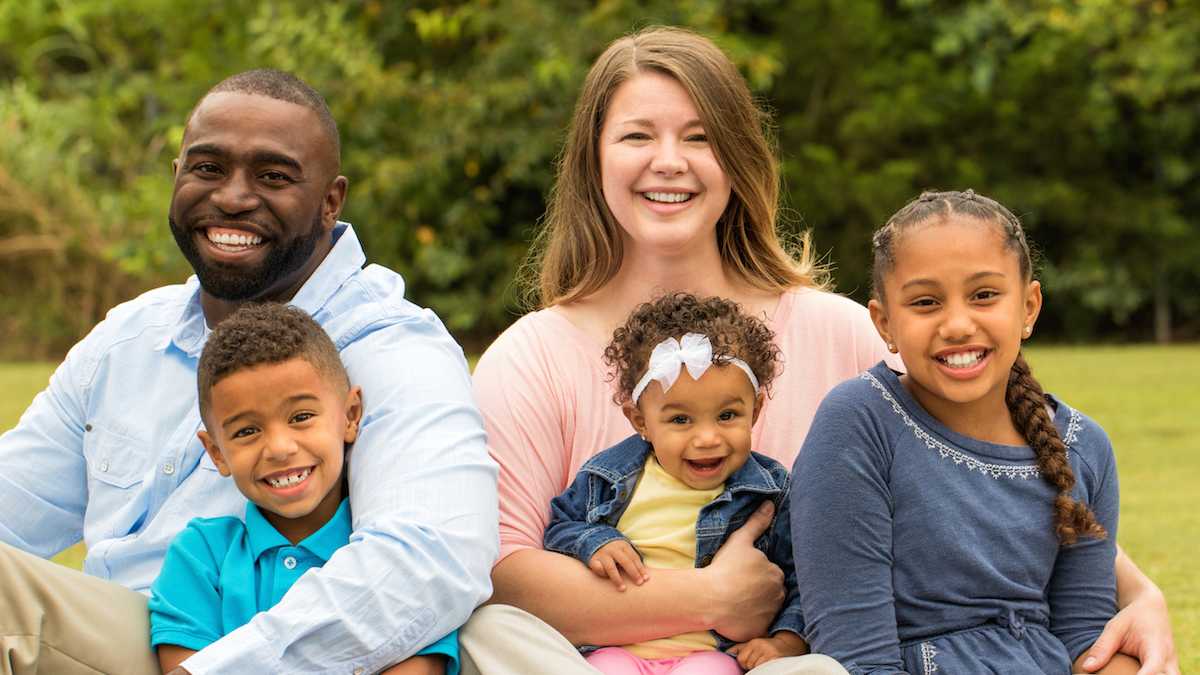Raising mixed-race kids who feel secure in their identity

(Family in park photo via ShutterStock)
I’m black American. My husband is from Spain. Before we started a family, the race of my future children never gave me cause for concern or worry. I guess I just assumed that since we lived in the United States, they’d be black like me. I did spend a lot of time researching the most successful ways to raise bilingual children. I actually thought the fact that my children were going to speak two different languages was going to be the biggest difference between us. I was wrong.
My children aren’t just black. They have a Spanish father. So that makes them biracial. And while finding the perfect label or identity box to check off on government forms is hardly a critical issue in my parenting routine, raising children who are secure in their ethnic identity often feels like a struggle.
Living in a country as race obsessed as the United States makes identity politics a necessary evil to explore when family members in the same household are different races. Please note, I firmly believe there is only one human race and that the false construct of race that was invented in the 18th century with intentions of creating a hierarchy of man, is complete and utter hogwash. Unfortunately, because as a nation we subscribe to said hogwash, I would be a bad parent if I did not address these issues with my children who will face questions and challenges about their racial identity. But the questions they face will be and are different from mine. These aren’t the kind of things they teach you how to deal with in a Parenting 101 class.
The types of parenting challenges that come up when you’re a different race than your child run the gamut from learning different hair and/or beauty routines to dealing with discrimination from other people. Many people assume only people who adopt transracially would deal with these issues, but interracial couples — like my husband and — also find ourselves in this predicament. And the burden is not always on white Americans who find themselves parenting a child of color. As a black mother who has a daughter who looks white, I’m constantly wondering if my parenting lessons are appropriate for my child. I wonder if by encouraging my sons to embrace their black identity, am I being dismissive of their Spanish heritage? I’ve never been mixed-race so I can’t reach back to my own past experiences to know the right way to provide my children with a positive sense of self.
I can’t reach back, but I can reach out.
Lucky for my children and for me, the mixed-race community in the United States is bigger and more visible than ever before. From the Mixed Remixed Festival to the Loving Day organization, there are plenty of resources for monoracial parents like myself raising multiracial children. And there are experts, like Sharon H. Chang, author of “Raising Mixed Race,” who are taking the time to share their wisdom in written form. My job then, is to take advantage of these resources and keep my mind open to the idea that my children’s ethnic identity is different from mine. But different doesn’t have to be negative or alienating. Admittedly, it can feel scary to acknowledge that our children will have different experiences than we did when they’re out in the world, but we should never let fear be our guide when it comes to parenting.
If white parents raising children of color fear what life will be like for their kids so they raise them with false concepts of colorblindness or without a healthy sense of their ethnic identity, a child will suffer. And likewise, if a parent of color raising a child who looks white or ethnically ambiguous only gives him one ethnic narrative to live by, then that child too will suffer if he doesn’t see himself in his parent’s history.
At the end of the day, I think a lot of what we’re called to do as parents in the 21st century requires a leap of faith. So much of it is new and unknown. But when it comes to raising our racially different children, I’m just thankful that I’m not out here doing it alone. The community of colorful families is getting bigger and bigger and I’m happy to be part of the crowd.
WHYY is your source for fact-based, in-depth journalism and information. As a nonprofit organization, we rely on financial support from readers like you. Please give today.

